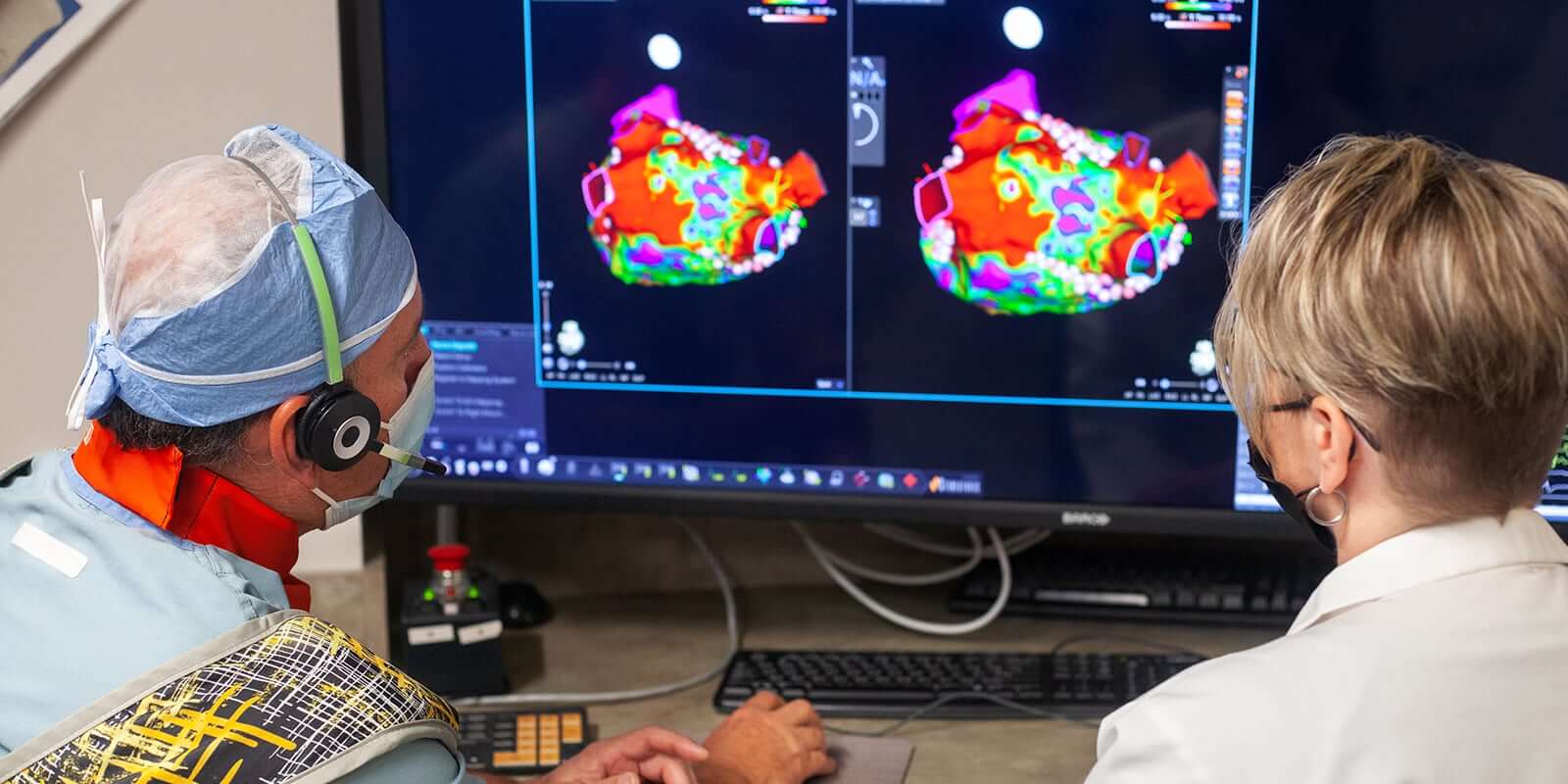
Catheter Ablation for the Treatment of Atrial Fibrillation
Catheter ablation is a minimally invasive and potentially curative treatment for atrial fibrillation. The procedure is performed under general anesthesia or conscious sedation and most patients are discharged home the same day.
Your heart health is important. Don’t delay care.
Call 216-844-3800 to schedule an in-person or virtual appointment with a UH atrial fibrillation specialist today.How Does Catheter Ablation Work?
Ablation delivers radiofrequency (hot) or cryo (cold) energy through a catheter (a thin flexible tube) to the areas of the heart where irregular electrical activity originates. The energy destroys (ablates) small areas of heart tissue containing the AFib triggers and creates tiny scars that break up and block the abnormal electrical signals, allowing normalization of the heart rhythm.
What Happens During a Catheter Ablation Procedure?
During an ablation procedure, catheters are inserted into blood vessels (at the right side of the groin) and advanced to different locations in the heart under X-ray and intracardiac echo guidance. The catheters record and map the arrhythmia (abnormal heart rhythm), to identify the areas in the atria (upper chambers of the heart) where the abnormal electrical activity is occurring. One of the catheters has a larger tip and is used to deliver the ablation energy to the target sites.
Throughout the catheter ablation, you will be monitored in many ways to assess vital signs, heart rhythm, your body’s response to anesthesia and any arrhythmias. Before you wake up at the end of the procedure, all catheters will be removed, and groin vessels will be sealed with collagen injection under the skin.
After the AFib ablation procedure, you will be transferred to an observation area for two to three hours, then discharged home with a detailed follow-up plan.
The ablated areas will completely heal in two to three months post procedure.

Who is Eligible for Catheter Ablation?
Minimally invasive catheter ablation may be a treatment option for symptomatic patients who do not respond to anti-arrhythmic medications or those who developed side effects to this type of medication. At times, it may also be appropriate as a first-line therapy for symptomatic patients with heart failure and/or poor heart function.
What to Expect After Your Ablation Procedure
In the first several days after the procedure, you may experience chest discomfort, mild shortness of breath and fatigue. If these symptoms persist or become severe, please notify your doctor or nurse. You should limit your activities and carry nothing greater than 10 pounds for the first week to avoid straining your groin. You may take a shower the day you are discharged from the hospital; however, do not soak in a bath/whirlpool or swim for the first week after the procedure. Keep the catheter sites clean and dry - do not use powder or lotion on these sites for the first week. If you have a fever (101°F or greater), swelling, redness or drainage from the catheter sites, please notify your care team.
Brief episodes of heart palpitations (heart fluttering, racing heart, skipping beats) may occur for the first two months after your ablation while your heart is healing. During this time, your doctor may want you to wear a monitor to record these events. If these episodes become lengthy and/or persistent, please call your doctor.
A follow-up visit with testing will be scheduled at one and three months after your ablation procedure. Testing may include an ECG (electrocardiogram), heart rhythm monitor and an echocardiogram, if needed.
What are the risks associated with catheter ablation?
Catheter ablation is considered a low-risk procedure. The atrial fibrillation specialists at University Hospitals have extensive experience in performing catheter ablation and use the most advanced technology available so serious complications are rare. However, as with any invasive procedure, there are some risks which should be considered. We advise all patients to discuss the risks and benefits of catheter ablation with their doctor before making the decision to go ahead with the procedure.


